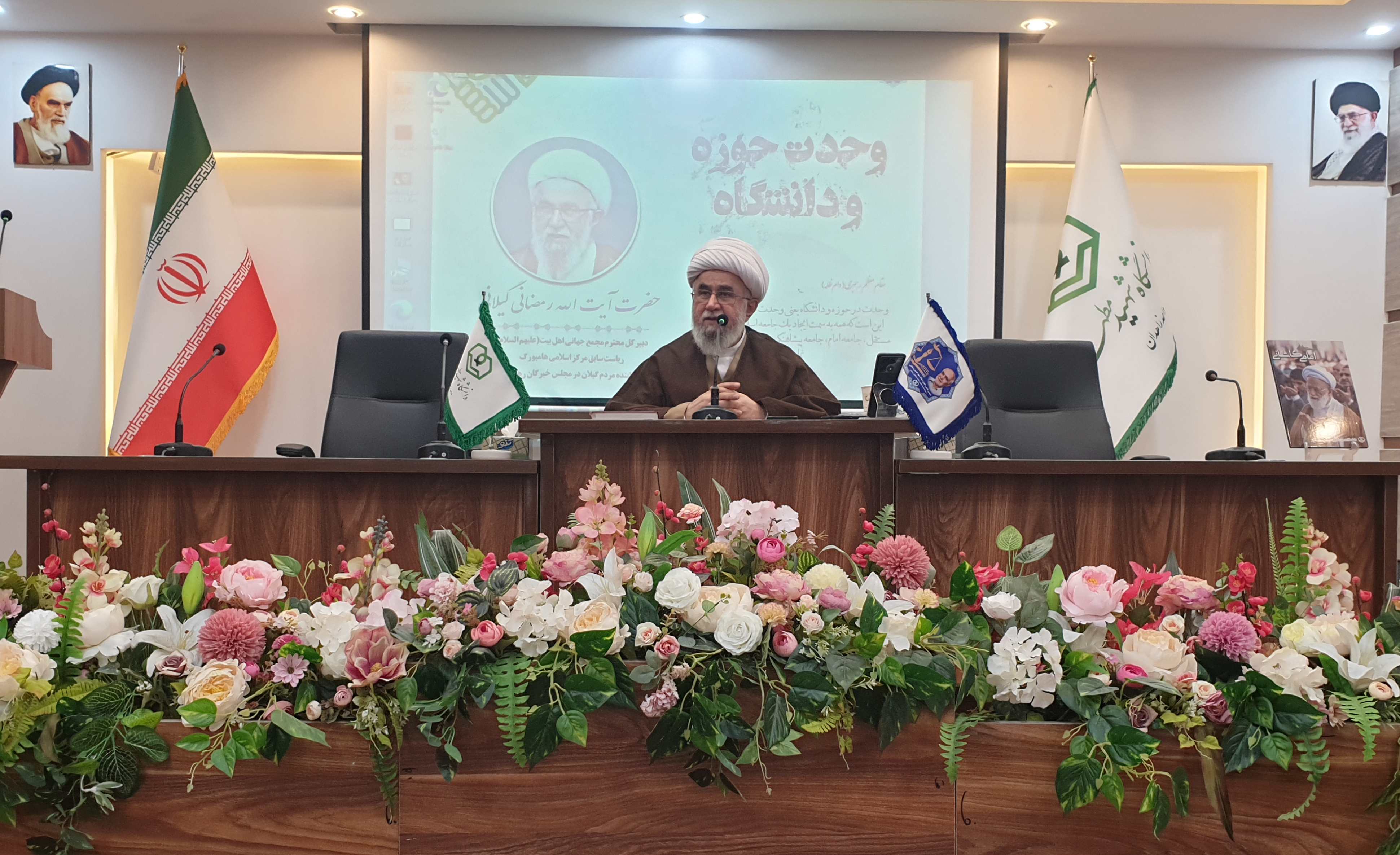AhlulBayt News Agency (ABNA): On Tuesday evening, December 17, 2024, Ayatollah Reza Ramazani addressed the students of the Martyr Motahhari University, Zahedan branch, saying, “Knowing Martyr Motahhari is of great importance. The intellectual foundations of the Islamic Republic’s governance are fully evident in his works. In explaining and analyzing theological, philosophical, and mystical teachings and their histories, Martyr Motahhari was a complete scholar.”
“You cannot find the concept of unity between seminaries and universities in the world, from the East to the West. There is no unity between churches and universities in the West. Similarly, even in Muslim countries like Indonesia, the topic of uniting seminaries and universities is absent,” he added.
Ayatollah Ramazani stated, “The late Imam Khomeini (r.a.), the founder of the Islamic Revolution of Iran, pioneered the idea of unity between seminaries and universities. Intellectual systems in both the East and the West have had two types of approaches toward religion. The first is an eliminative confrontation, which was dominant in countries like China and the former Soviet Union. However, this approach has now been thrown into the dustbin of history. Today, however, the situation changed. In Moscow, for instance, many Islamic centers, both Shia and Sunni, are active.”
“The second approach toward religion aims to limit it. The humanism school of thought emerged in Western systems, particularly during the Renaissance. This school sought to guide human life without reliance on divine revelation,” added the member of the Assembly of Leadership Experts.
“If religion is removed from governance, the concept of unity loses its meaning. In governments that restrict religion, the unity of churches and universities is unthinkable. Some of our intellectuals, who fail to grasp the root of the matter, seek to deny the possibility of unity between seminaries and universities,” Ayatollah Ramazani said.
The Secretary-General of the AhlulBayt (a.s.) World Assembly further explained, “The limitation of religion gave rise to the theory that no revolution could succeed in the name of religion and that future revolutions would either be secular or laic. Yet, during this very era, the late Imam Khomeini (r.a.) proved that religion was effective in establishing a political system. Religion has much to offer in various human domains, including the education and development of individuals and the building of societies.”
“There are examples of the establishment of religious governance during the time of the Holy Prophet (p.b.u.h) and Imam Ali (a.s.),” Ayatollah Ramazani pointed out, “Religious governance pursues two objectives: creating a monotheistic system and establishing justice within society.”
The member of the Assembly of Leadership Experts stated, “The West remains unchanged on defining humans solely as sensory beings. However, divine prophets came to elevate humanity from a sensory state to an intellectual one, and beyond that, to a mystical state. Unfortunately, Western beliefs about the afterlife are faint and dismissive.”
“In the postmodern society, where science is seen as the ultimate authority, religion has no place. When the Eastern bloc sought to eliminate religion and the West attempted to restrict it, Imam Khomeini (r.a.) created the Islamic Revolution as a miracle. He demonstrated that religion has a framework for governance and that it is possible to lead a revolution based on religious principles even in the contemporary world,” Ayatollah Ramazani added.
Highlighting the reformative role of seminary and university scholars as the elite of society, the Secretary-General of the AhlulBayt (a.s.) World Assembly said, “It is the university scholars who manage the political system based on Islamic discourse, which aims for social justice and individual monotheism.”
“To establish an advanced society and an Islamic government, both hardware and software are required. This hardware and software include scientific progress, morality, spirituality, justice, combating corruption, and Islamic lifestyles, which are emphasized in the ‘Second Phase of the Revolution’ statement by the Supreme Leader,” he added.
Ayatollah Ramazani spoke about the power of knowledge, saying, “Science can bring authority and strength. A society must adhere to ethics and spirituality. The unity of seminaries and universities can provide the hardware and software needed to establish an Islamic society.”
“The realm of knowledge should not distance us from religion but should help reinforce our beliefs,” he stressed, “We need an Islamic society, and an Islamic society needs an Islamic university that adopts a value-based perspective to achieve the new Islamic civilization.”
On the unity of the seminary and university, Ayatollah Ramazani emphasized, “This unity is strategic, not tactical. The seminary can adopt academic research methods, while the university can benefit from the seminary’s tradition of debate.”
Regarding jurisprudence and its relationship with the practical philosophy of governance, the Secretary-General of the AhlulBayt (a.s.) World Assembly explained, “Jurisprudence is the practical philosophy of governance, teaching people the way of life. The late Imam Khomeini (r.a.) emphasized that the comprehensive jurisprudence of AhlulBayt (a.s.) is the software for achieving an Islamic society.”
“By integrating social jurisprudence with individual jurisprudence, jurisprudence can serve as the software for realizing the Islamic system,” he concluded.
**************
End/ 345

